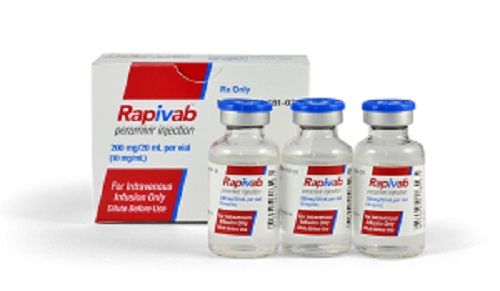Rx Update: Rapivab (Peramivir)

BioCryst Pharmaceuticals received approval on December 22, 2014, for Rapivab, an influenza virus neuraminidase inhibitor indicated for the treatment of acute uncomplicated influenza in patients 18 years or older who have been symptomatic for no more than 2 days.
Limitations of use: efficacy was based on clinical trials in which the predominant influenza virus type was influenza A; a limited number of subjects infected with influenza B virus were enrolled. Available information on influenza drug susceptibility patterns and treatment effects should be considered when deciding whether to use. Efficacy could not be established in patients with serious influenza requiring hospitalization.
Neuropsychiatric events: patients with influenza may be at an increased risk of hallucinations, delirium, and abnormal behavior early in their illness. Monitor for signs of abnormal behavior. The most common adverse reaction (incidence >2%) is diarrhea. (Serious skin/hypersensitivity reactions such as Stevens-Johnson syndrome and erythema multiforme have also occurred with Rapivab.)
Use of intranasal live attenuated influenza vaccine should be avoided 2 weeks before or 48 hours after administration of Rapivab, unless medically indicated. Rapivab should be used during pregnancy only if the benefit outweighs the risk. Caution should be exercised when administering Rapivab to a patient who is breastfeeding.
Source: Rapivab prescribing information.

Knock Out Aches and Pains From Cold
October 30th 2019The symptoms associated with colds, most commonly congestion, coughing, sneezing, and sore throats, are the body's response when a virus exerts its effects on the immune system. Cold symptoms peak at about 1 to 2 days and last 7 to 10 days but can last up to 3 weeks.
COPD: Should a Clinician Treat or Refer?
October 27th 2019The Global Initiative for Chronic Obstructive Lung Disease (GOLD) defines the condition as follows: “COPD is a common, preventable, and treatable disease that is characterized by persistent respiratory symptoms and airflow limitation that is due to airway and/or alveolar abnormalities usually caused by significant exposure to noxious particles or gases.â€
Diabetic Ketoacidosis Is Preventable With Proper Treatment
October 24th 2019Cancer, diabetes, and heart disease account for a large portion of the $3.3 trillion annual US health care expenditures. In fact, 90% of these expenditures are due to chronic conditions. About 23 million people in the United States have diabetes, 7 million have undiagnosed diabetes, and 83 million have prediabetes.
What Are the Latest Influenza Vaccine Recommendations?
October 21st 2019Clinicians should recommend routine yearly influenza vaccinations for everyone 6 months or older who has no contraindications for the 2019-2020 influenza season starting at the end of October, according to the Advisory Committee on Immunization Practices.
What Is the Best Way to Treat Pharyngitis?
October 18th 2019There are many different causes of throat discomfort, but patients commonly associate a sore throat with an infection and may think that they need antibiotics. This unfortunately leads to unnecessary antibiotic prescribing when clinicians do not apply evidence-based practice.
